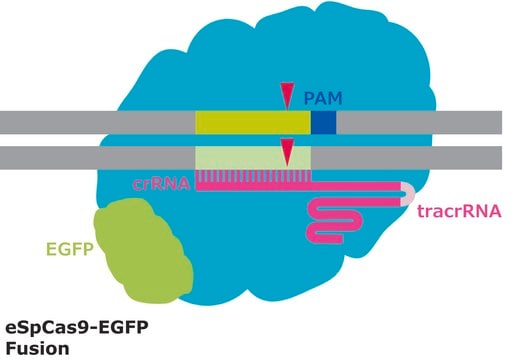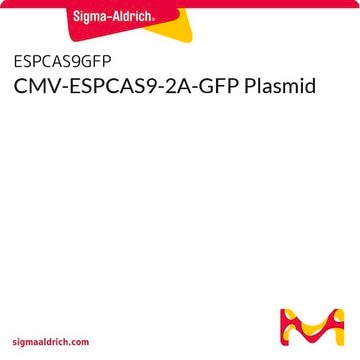CAS9GFPPRO
Cas9-GFP Protein
from Streptococcus pyogenes, fused with enhanced GFP, recombinant, expressed in E. coli, 3X NLS
Synonym(s):
Cas9-EGFP, SpCas9-EGFP, SpCas9-GFP
Sign Into View Organizational & Contract Pricing
All Photos(1)
About This Item
UNSPSC Code:
12352202
NACRES:
NA.51
Recommended Products
recombinant
expressed in E. coli
Assay
≥90% (SDS-PAGE)
form
lyophilized powder
packaging
pkg of 1 kit (3 components)
reporter gene
GFP
shipped in
wet ice
storage temp.
−20°C
General description
Recombinant Cas9-GFP protein from Streptococcus pyogenes (~194 KD) is a ready-to-use reagent for genome engineering experiments. When combined with target-specific guide RNAs, wild type Streptococcus pyogenes Cas9-GFP protein will act as a targeted nuclease suitable for transfection of cell cultures and for the accelerated development of genetically-modified animals via one-cell embryo injection.
An N-terminally fused enhanced green fluorescent protein with an excitation peak at 488 nm and emission peak at 509 nm allows for visualization of transfected RNP complex in addition to utility in flow cytometry applications. The protein also contains three varied nuclear localization sequences postioned for optimal activity.
An N-terminally fused enhanced green fluorescent protein with an excitation peak at 488 nm and emission peak at 509 nm allows for visualization of transfected RNP complex in addition to utility in flow cytometry applications. The protein also contains three varied nuclear localization sequences postioned for optimal activity.
Application
- Functional Genomics
- Target Validation
- Genome Editing
- Fluorescence Microscopy
- Flow Cytometry
Features and Benefits
- Highly specific
- Highly active
- Ready-to-inject/transfect
Packaging
- pkg of 50 μg( ≥260 pmol )
- pkg of 250 μg( ≥1300 pmol )
Components
Each kit consists of
- one vial of lyophilzed Cas9-GFP recombinant protein
- one vial containing 1 mL of 1× dilution buffer
- one vial containing 1 mL of nuclease-free water with glycerol
Principle
CRISPR/Cas systems are employed by bacteria and archaea as a defense against invading viruses and plasmids. Recently, the type II CRISPR/Cas system from the bacterium Streptococcus pyogenes has been engineered to function in eukaryotic systems using two molecular components: a single Cas9 protein and a non-coding guide RNA (gRNA). The Cas9 endonuclease can be programmed with a gRNA, directing a DNA double-strand break (DSB) at a desired genomic location. Similar to DSBs induced by zinc finger nucleases (ZFNs), the cell then activates endogenous DNA repair processes, either non-homologous end joining (NHEJ) or homology-directed repair (HDR), to heal the targeted DSB.
Reconstitution
Lyophilized S. pyogenes Cas9-GFP protein should be resuspended in the Reconstitution solution provided to desired concentration. Gently tap tube to completely dissolve lyophilized powder, incubate for 10 minutes on ice, and spin tube to bring material to bottom of tube.
Other Notes
Use our CRISPR Selection Tool to order gRNA
Check out our other MISSION® Cas9 Proteins at SigmaAldrich.com/CRISPRproteins
Check out our other MISSION® Cas9 Proteins at SigmaAldrich.com/CRISPRproteins
Legal Information
MISSION is a registered trademark of Merck KGaA, Darmstadt, Germany
Storage Class Code
11 - Combustible Solids
Certificates of Analysis (COA)
Search for Certificates of Analysis (COA) by entering the products Lot/Batch Number. Lot and Batch Numbers can be found on a product’s label following the words ‘Lot’ or ‘Batch’.
Already Own This Product?
Find documentation for the products that you have recently purchased in the Document Library.
Customers Also Viewed
Simone Scintilla et al.
Frontiers in plant science, 13, 1078931-1078931 (2022-12-20)
The application of New Breeding Techniques (NBTs) in Vitis vinifera is highly desirable to introduce valuable traits while preserving the genotype of the elite cultivars. However, a broad application of NBTs through standard DNA-based transformation is poorly accepted by public
Our team of scientists has experience in all areas of research including Life Science, Material Science, Chemical Synthesis, Chromatography, Analytical and many others.
Contact Technical Service















